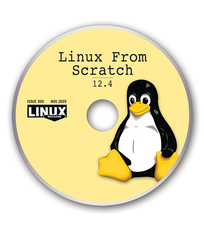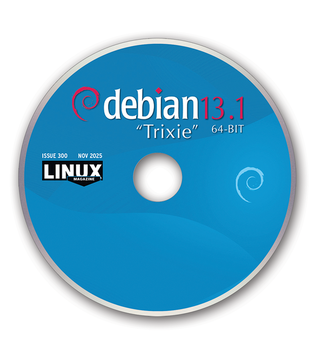On the DVD
On the DVD

Linux From Scratch 12.4 and Debian 13.1 "trixie"
This month's DVD includes a classic Linux distro and a classic tutorial showing you how to build your own Linux distro.
Linux From Scratch 12.4
Side A
Side A comes with the famous Linux From Scratch (LFS) distro-building project [1] and associated files. On the disc, you will find directories with:
- Linux From Scratch – a book-length tutorial describing how to build your own Linux system
- Linux From Scratch systemd – a version of Linux From Scratch for today's systemd systems
- Hints – referred to by the LFS team as "small documents that explain how to do things that are not covered in the LFS or BLFS books." The hints offer alternative configurations and troubleshooting tips.
Also included on this DVD is Gaming Linux From Scratch (GLFS), which helps you set up gaming support software like Steam or Wine. Note that GLFS requires the Beyond Linux From Scratch tutorial, which is not on this DVD but is available online [2].
Important note: Linux From Scratch is not a Linux distro, so you can't boot it like you would with most of our Linux Magazine DVDs. Just mount the disc and access the files using your file manager or a command-line equivalent.

Debian 13.1 "trixie"
Side B (64-bit)
Side B on this month's DVD is Debian 13.1 [3] [4]. Debian is the quintessential community Linux, with vast repositories and a global team of developers. Debian serves as a source for several other well-known Linux distros, including Tails, Ubuntu, and Kali Linux. Version 13.1 is the first update to the major release Debian 13 "trixie," which appeared in August 2025 with more than 14,000 new packages, and is slated to receive five years of support from the Debian team.
Linux From Scratch 12.4
An earlier version of this article appeared in Linux Magazine, issue 251, October 2021.
Linux From Scratch (LFS) and Beyond Linux From Scratch (BLFS) are online tutorials that provide step-by-step instructions for how to compile and assemble your own Linux system from freely available sources. The abbreviation LFS refers to both the documentation and the resulting Linux system.
If you've been around Linux long enough, you have probably come across the need to compile software – either from a homegrown application or possibly from source code available at an open source project website. You might think that compiling an operating system is similar, and in some ways it is, but building a complete operating system is vastly more complicated than compiling your average desktop application.
Keep in mind that the modern distro you are using to build that desktop app already has a complete toolchain that has been tested and approved for compatibility. Imagine that this build environment doesn't exist yet and you have to create it. That includes a compiler and also important libraries such as glibc and libstdc++. The Linux From Scratch instructions (sometimes called the book) contain 11 chapters that are divided into five major parts. The authors break the process of building a Linux system into three stages (Figure 1):
- Configure a build host
- Build a cross toolchain and temporarily required tools
- Create the actual LFS system

Gerard Beekmans, the author of LFS, started working with Linux in 1998. After using various distributions, he realized that he could not find a "one size fits all" solution, and he would need to build his own system. When he started compiling, he quickly discovered that he had unleashed an onslaught of compile-time errors and circular dependencies. The experience he gained, which he shared with the Linux community, met with such widespread interest that the LFS project was born.
If you follow the instructions, you will end up with a minimal Linux system that includes an ext4 filesystem, Grub 2.12, Kernel 6.16.1, Bash 5.3, GCC 15.2.0, Perl 5.42.0, Python 3.13.7, and Vim 9.1. The build takes a good deal of time: Count on it taking several hours even with the tests turned off.
Buy this article as PDF
(incl. VAT)
Buy Linux Magazine
Subscribe to our Linux Newsletters
Find Linux and Open Source Jobs
Subscribe to our ADMIN Newsletters
Support Our Work
Linux Magazine content is made possible with support from readers like you. Please consider contributing when you’ve found an article to be beneficial.

News
-
Introducing matrixOS, an Immutable Gentoo-Based Linux Distro
It was only a matter of time before a developer decided one of the most challenging Linux distributions needed to be immutable.
-
Chaos Comes to KDE in KaOS
KaOS devs are making a major change to the distribution, and it all comes down to one system.
-
New Linux Botnet Discovered
The SSHStalker botnet uses IRC C2 to control systems via legacy Linux kernel exploits.
-
The Next Linux Kernel Turns 7.0
Linus Torvalds has announced that after Linux kernel 6.19, we'll finally reach the 7.0 iteration stage.
-
Linux From Scratch Drops SysVinit Support
LFS will no longer support SysVinit.
-
LibreOffice 26.2 Now Available
With new features, improvements, and bug fixes, LibreOffice 26.2 delivers a modern, polished office suite without compromise.
-
Linux Kernel Project Releases Project Continuity Document
What happens to Linux when there's no Linus? It's a question many of us have asked over the years, and it seems it's also on the minds of the Linux kernel project.
-
Mecha Systems Introduces Linux Handheld
Mecha Systems has revealed its Mecha Comet, a new handheld computer powered by – you guessed it – Linux.
-
MX Linux 25.1 Features Dual Init System ISO
The latest release of MX Linux caters to lovers of two different init systems and even offers instructions on how to transition.
-
Photoshop on Linux?
A developer has patched Wine so that it'll run specific versions of Photoshop that depend on Adobe Creative Cloud.
